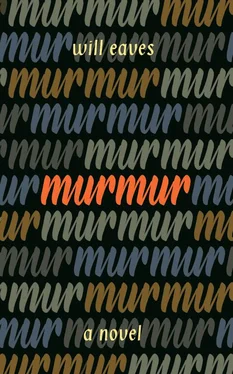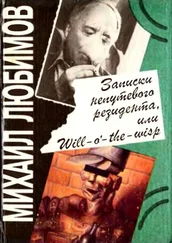I knock. The sound awakens sense.
Home is a force that acts on me whether I will or no, and under its impressive influence I gain mass, inertia, dragging my feet. It needs some great exertion of the will to overcome that force. I’m like a game of tennis played on the seabed.
June’s free of it. Massless she speeds, a particle of light, while I’m involved in treaclish stuff. Oh God, the prospect of small talk! Torpor. Decisions unmade, futures always merely to be entertained. However much the world ages, deformed by war and entropy, the parquet and the chevrons on my socks point the same way.
The parlor’s scarcely recognizable, the ceiling and its rose replaced by high arches and braziers. The stone-gray walls, running with damp, have been stripped of their bosky views and photographs of father in Madras. The hands have fallen from the clock, which still clucks with embarrassment above a murky rectangle where once a dresser stood. The books are gone from the glass-fronted cabinet between the bay window and fireplace. Missing: Kipling, Gibbon, and Wells, but also Heyl, Bohm, Kant, and Schrödinger. And Tenney Brewster’s Natural Wonders Every Child Should Know . Nothing so strange as empty shelves, the libraries of dust; or the ironical verdict of our barometer, hanging beside another ghost picture, predicting CHANGE.
Nothing, except where everything is strange and so familiar. The table, black, immense, carved from a single piece of oak, has been pushed closer to the fire. The damask tablecloth has been removed. That mossy-colored drape now shrouds a large freestanding oval object at one end of the parlor, near to the screen-partition doors.
The arts-and-crafts armchairs? No more. Two high-backed seats, ornately carved like bishop’s thrones, remain. June sits on one, next to the fireplace, facing the oval shroud. She looks puzzled and wan and turns her head as I enter, smiles with a shy perplexity that says: I ought to know what’s happening . Behind her is the other chair, its sides gripped by an angry little pair of hands.
The knuckles flush. A sharp voice fills the room with sarcastic ferocity: it is the voice of my brother.
“—a fantasy or prank, more like, which he has executed with his customary ruthless inconsistency. I looked perfectly normal yesterday.” The hands unflex, then seize the chair again. “It’s typical, Mother. No thought for anyone’s feelings except—”
“Alec, my dear.” My mother cuts him off. “At last! June said she’d found you loitering on the downs, counting daisies. Such a resourceful girl. I like her very much.”
Mother looks splendid in a red-lined cape and high collar, her skin moonshine, the cheekbones raised, the teeth one long enamel flash. Beneath the cape she wears a bell-sleeved purple gown with gold ceinture. And when she rubs her youthful hands, they move very convincingly.
“Pay no attention to poor John. He’s cross.”
“I’ll be the laughingstock.”
“Really,” Mother exclaims, not sounding at all shocked. “One never would have thought, at such a time as this—in time of war—the sacrifice of vanity—masculine vanity at that—so very terrible.”
The hands gripping the chair go white. “It isn’t vanity, it’s pride! A regiment needs solidarity. The ranks have to respect each other. That’s the core of army discipline. I’ve overall command of fifteen hundred men at Sidi Barrani, fifty light tanks, a very difficult chain of supply. And every day the threat of Italian counterattack—”
“‘We also serve who only stand and wait.’ And cook,” puts in Mother, busy behind the table with a wild array of beakers, flasks, and demijohns. “I’m making one of my potions. An elderflower cordial.”
“—while my brother, the famous don—what is it? Oh yes. Does something for the FO, that we don’t know about, can’t know about, but which we may be sure comes with a tidy salary, is well supplied, and bloody safe.”
“Now, John, no bitterness. We’ve been through this.”
Mother opens an old grimoire beside a glistening retort. She murmurs to herself, “Mummy dust, henbane, cloves… sugar? Lemons? Where do they think we are? I’ll have to improvise.” And then looks up: “Alec, we did ask June what she was doing at the Admiralty and she said it was just statistical. Primarily routine.” She stops. “And… secondarily? Could you enlighten us?”
June hangs her head. There’s nothing we can say. We only know what we do because we work on the same machine in the same hut. The other huts are separate fiefdoms. We’re none of us allowed to speak about our work—we signed the Act—and yet, of course, I have to give details of how we met.
And so I offer up our agreed version of the truth, the true-enough outline—the office girls, a natural camaraderie, trips to the cinema on our days off, a shared interest in Fibonacci numbers (“ Really? ”), chess.
Mother simpers and purrs. She prefers bridge.
“Good God, woman!” John shouts. “Can you not tell when someone’s patronizing you? Look at him mumbling! The same old rag. We’re being laughed at by the higher-ups. ‘It’s just statistical.’ ‘We both play chess.’ Oh, I know , everything is on the QT, lives are lost through conversation—but it’s not the secrecy and confidentiality I mind. It’s the superiority, as if we couldn’t hope to understand. We’re being watched , Mother. Ordered about, put in our place.”
“I’d no idea,” I say, “you suffered by my hands so much.”
“What would you know about suffering?” The chair jumps forward half an inch. “Last week I pulled a gunner through the hatch of my A9 only to find him missing from the chest upward. He poured on top of me, dear Christ. What do you think happens, Alec, after you make your best guesses and sign your chits for resources? Where does the war go after it has been discussed and plotted on a chart? What happens to the rest of us, the little people, then?”
A sibling in full spate is always frightening, their anger a surprisingly powerful defense, their deeper impotence equally powerful, absurd.
John throws the chair aside and stands revealed, arms wide, red-faced, fatigued, weeping with shame and frustration. His toy-sized uniform clings to a pear-shaped build. He is a dwarf.
It’s not that I don’t know about suffering, but I am bound. What can I do, apart from what I do already, in my own unmentionable realm? Words are forbidden me. That is the real answer, the right one, which I cannot give.
“John, what is it you want—”
“He wants a proof,” June says, raising her hands to calm us down. She’s staring at the damask drape, her brows drawn in. “Don’t you, John Pryor? Need some warranty. Convincing proof.”
He barely nods.
“Imagine, if you can,” he says, “what it is like to do your best, to serve, to wait for leave, and then to wake one day, back home, to find it’s all an act. You’re not even a man.” He stops. A sob comes out as a failed cough. The little man catches his breath. In pauses between frames, his tears fidget and swell.
Mother’s eyes glitter by the hearth.
“You were always the favorite.” John drops his arms, his head. His shoulders slump. “You never had opinions, Alec. You just knew. That’s what you’d say. ‘I always knew the apple in the Bible was both green and red.’” He looks at me. “But can you tell me—do you know what’s going to happen, whether we will win?”
I play for time. “In general, one can never know…” But John is having none of it. He asks me if I think they’ll come, if I’ve received warning, and I say, “No. But invasion can’t be ruled out. The truth is that it’s probable.”
Читать дальше












